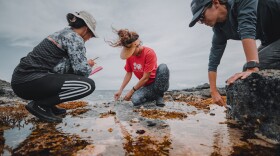Wild pigs continue to disrupt local agriculture and ecosystems, especially on island habitats, according to researchers at the University of Hawaiʻi at Mānoa and the Royal Melbourne Institute of Technology,
Wild pigs are unique among invasive species because they can act as both top predators and destructive herbivores, researchers say.
Hawaiʻi’s first pigs originally came with Polynesians who brought an Asianic breed of pig. James Cook’s arrival brought a European type of pig. The two pigs hybridized, and researchers believe this is when they became feral.
Wild pigs act as an “ecosystem engineer.” They can root and dig enough to alter the soil structure, which fundamentally changes the ecosystem type.
"Rooting and digging is this unique ecological function that none of the species here have coevolved with. They don’t have the defensive mechanisms to mitigate those impacts when those species are introduced," says Derek Risch, a spatial wildlife and conservation planner at the UH Mānoa.
"That’s one of the running theories why some island endemics are so vulnerable to the impacts of wild pigs, because they lack the evolutionary trait that they’ve coevolved over thousands and thousands of years to defend against those types of ecological functions," Risch explains.
Risch hopes his research will help conservation managers in Hawaiʻi make decisions on how to handle wild pigs.




